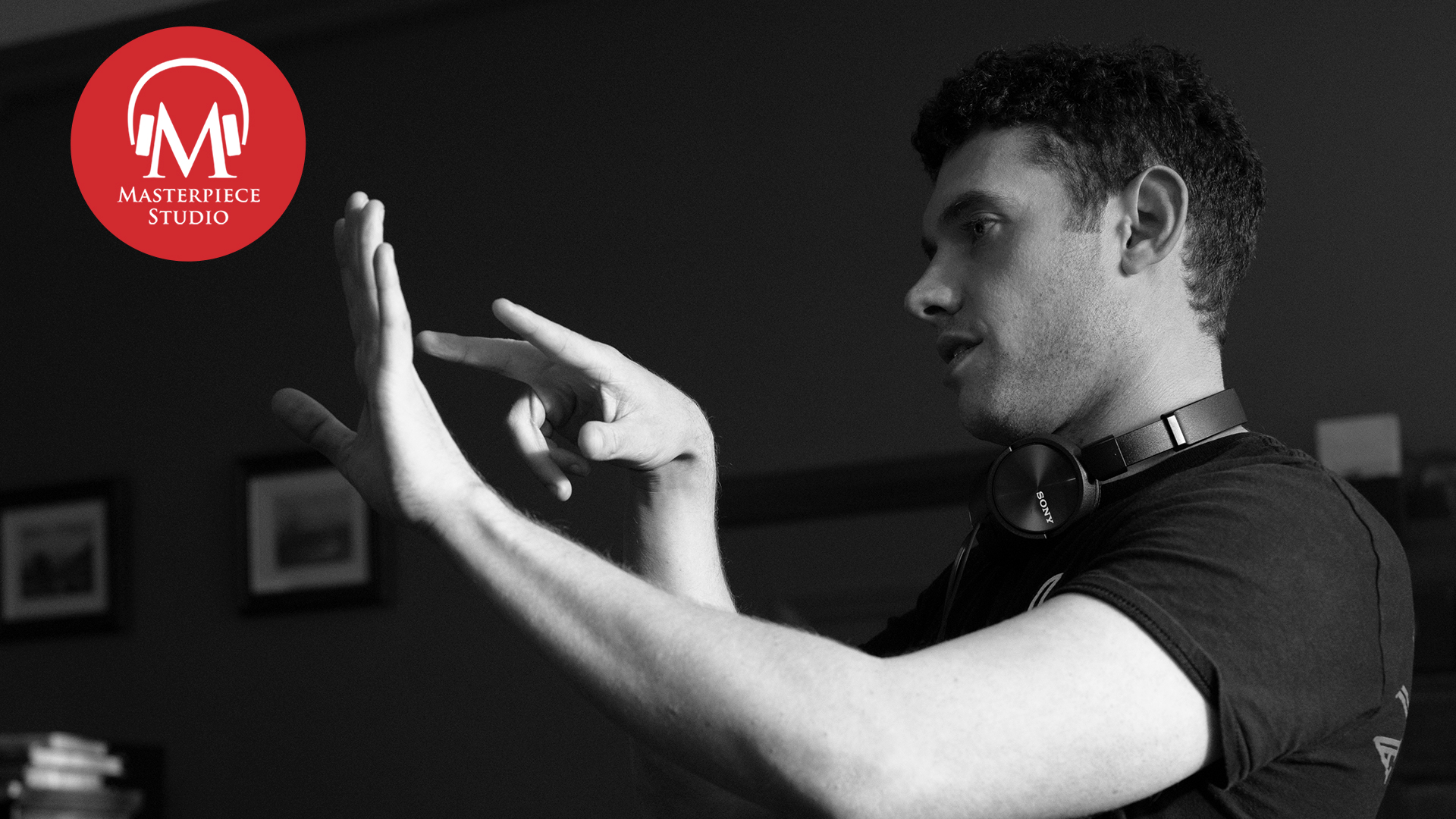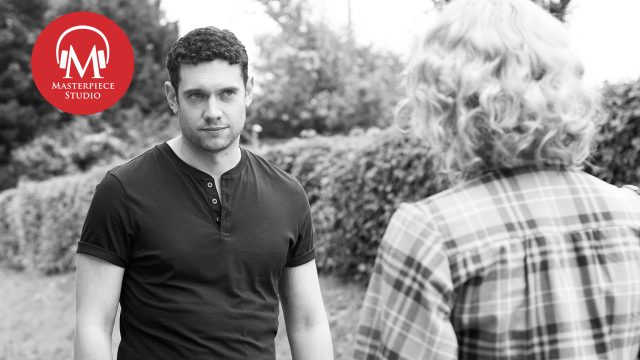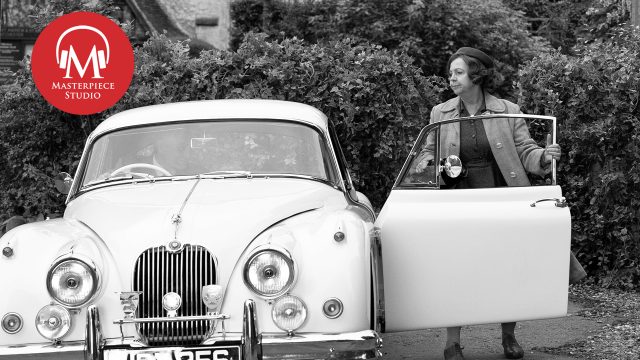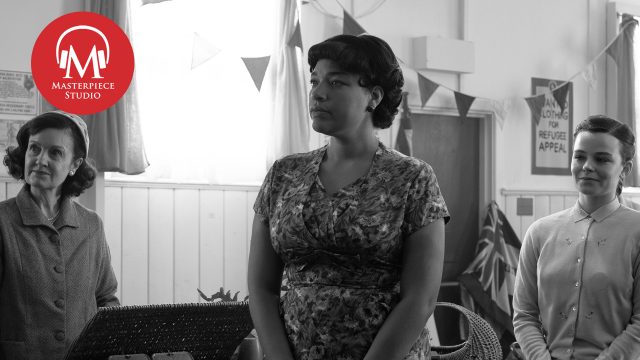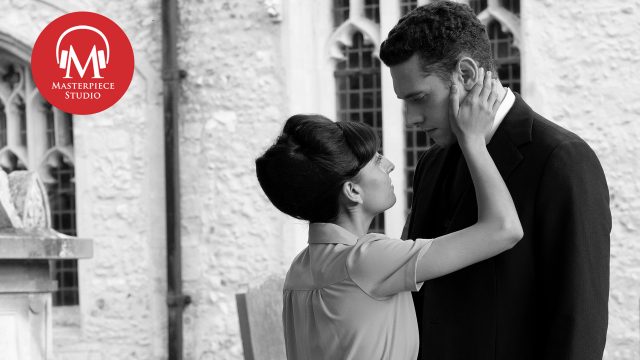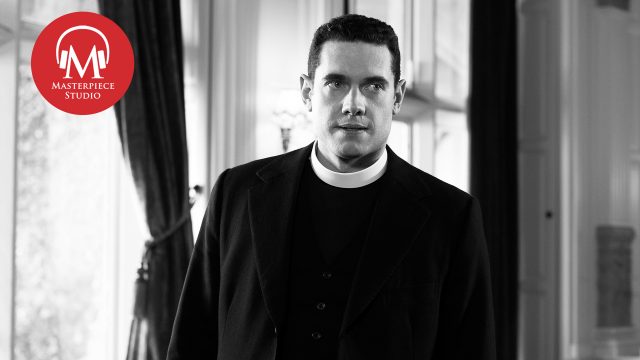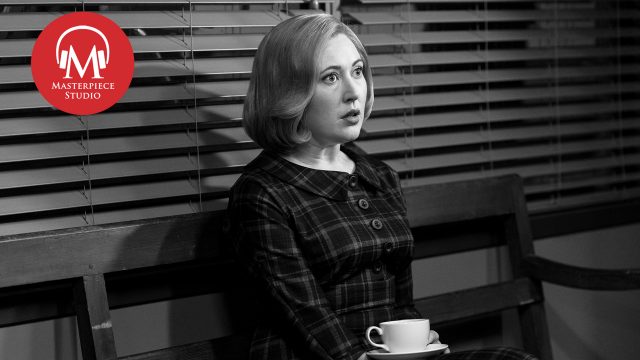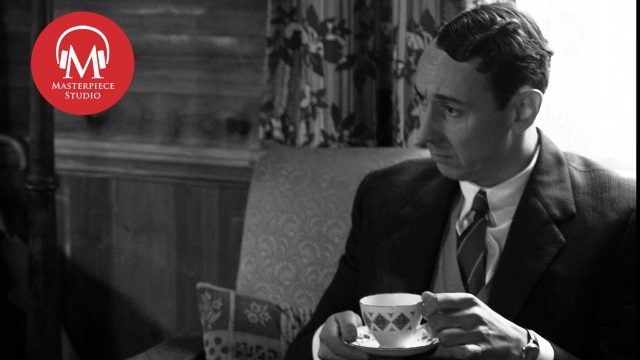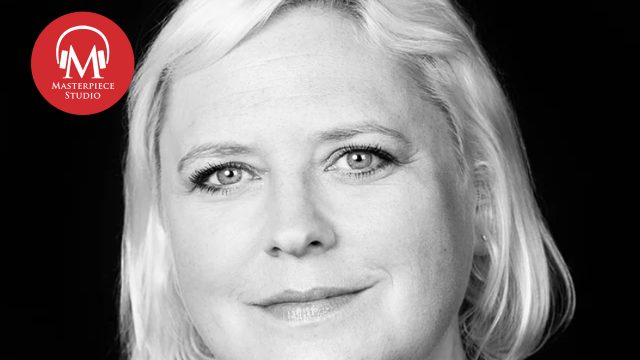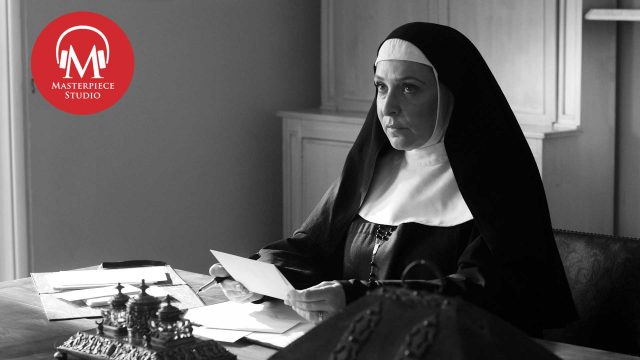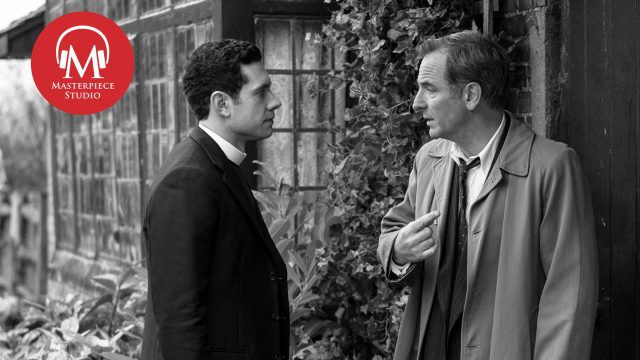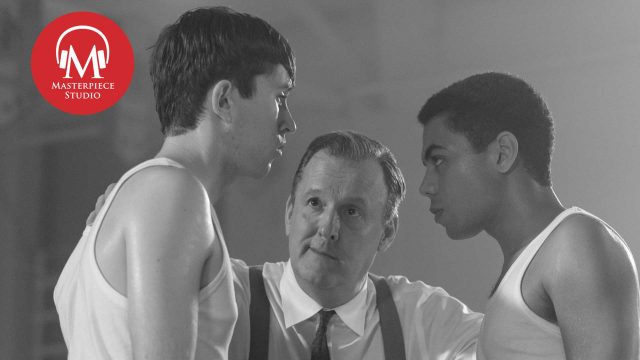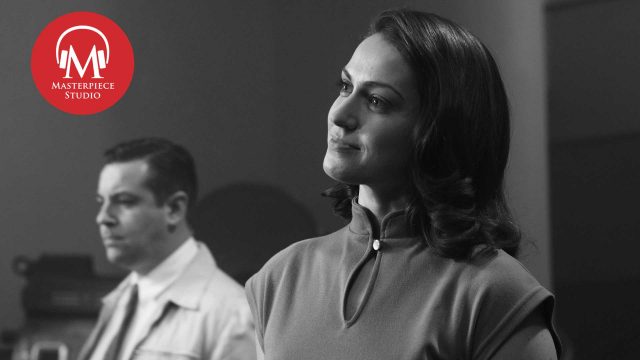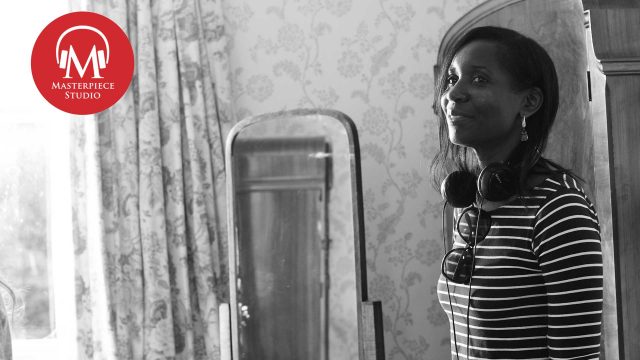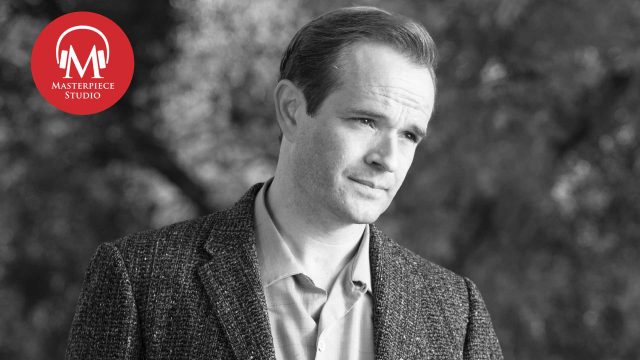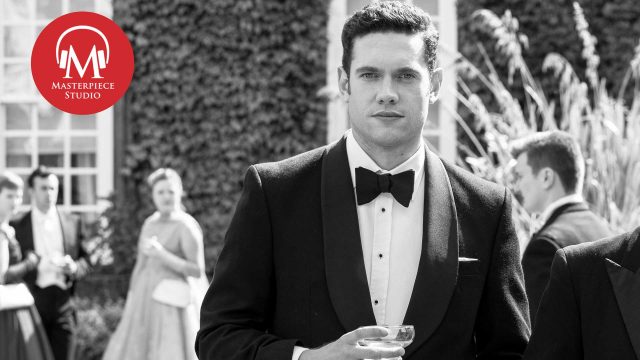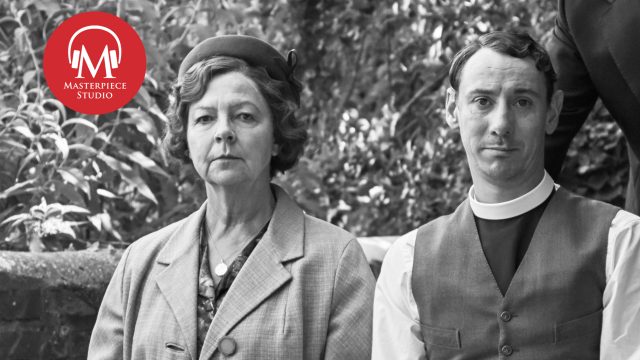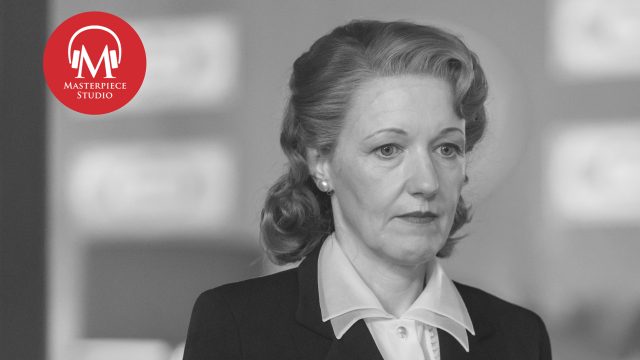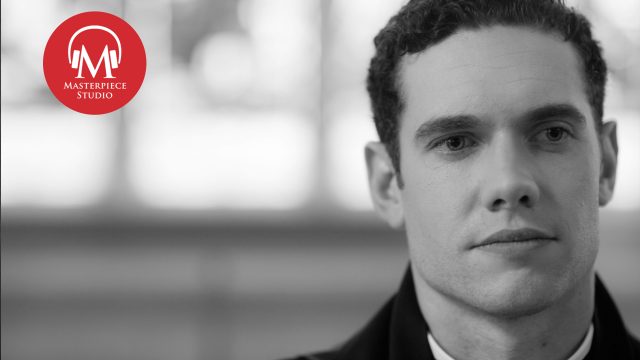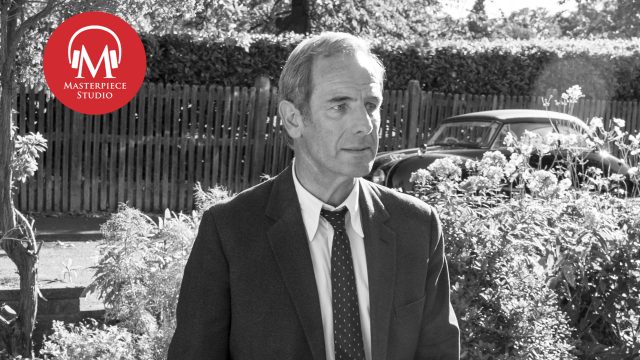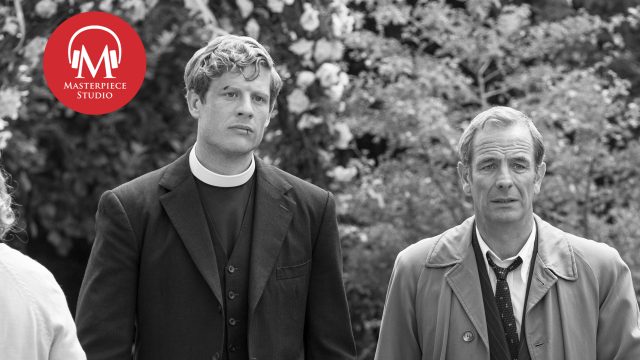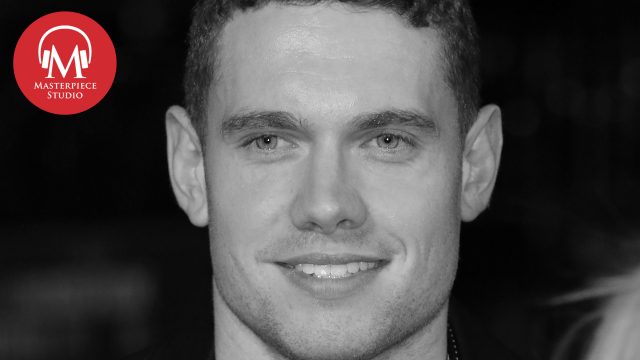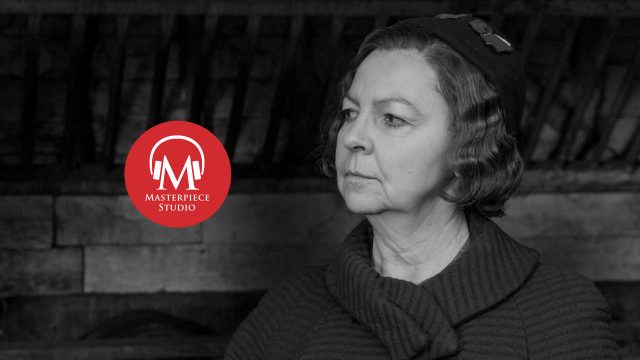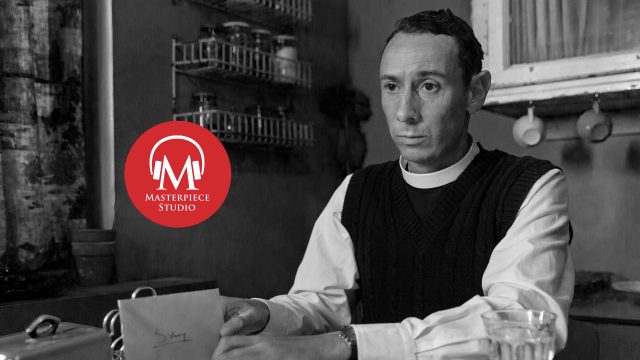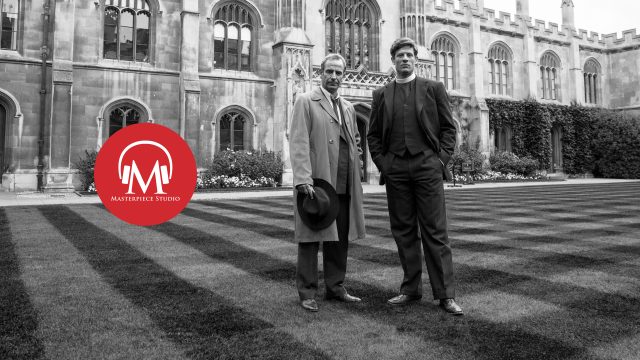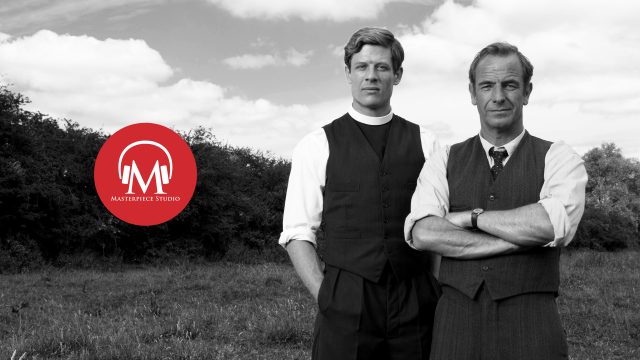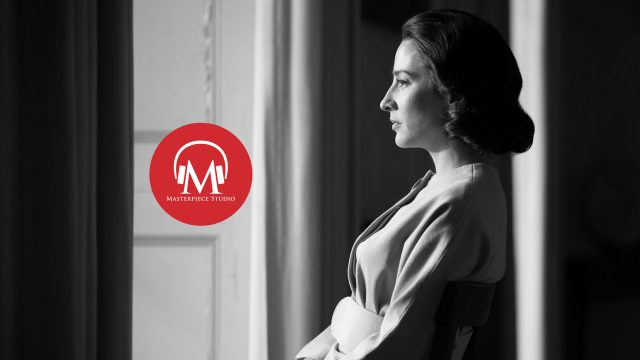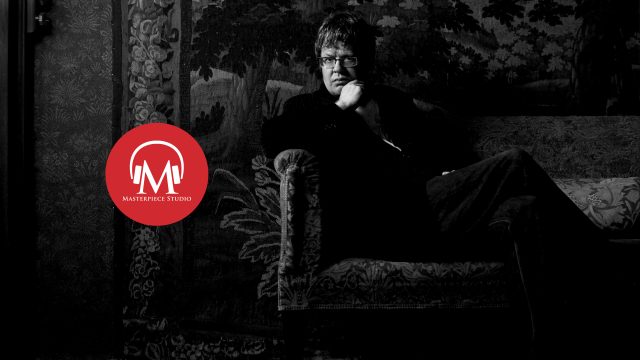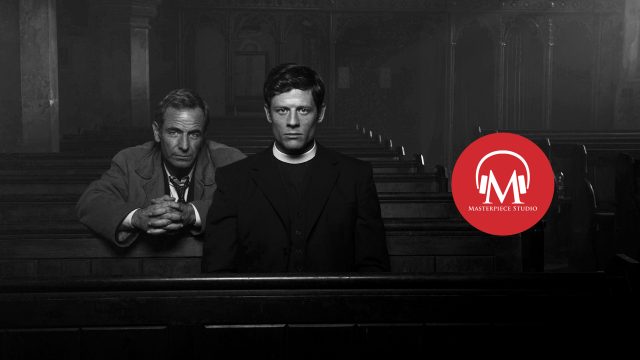Grantchester lead Tom Brittney already took a big leap in leading a series after a beloved main character left — and now, he takes on a new challenge in directing that show, too. The actor and director returns to the podcast for a very cinematic conversation about where he draws inspiration behind and in front of the camera.
Download and subscribe on: iTunes | Spotify| RadioPublic
Transcript
Jace Lacob: I’m Jace Lacob, and you’re listening to MASTERPIECE Studio.
A serial killer is on the loose in rural Cambridgeshire — and former curate Leonard Finch is hot on the case.
CLIP
Leonard Let’s find out if he’s Robin.
Geordie Oh no. No…you don’t. New boss not keen on my religious advisors.
Leonard How does he feel about ex-cons?
Geordie He never expressed an opinion.
Leonard I’d say that’s positively an invite.
Jace As the bodies of unhoused strangers pile up around his struggling new beat café, Leonard feels obligated to lend a hand in Geordie’s investigation.
CLIP
Leonard If you need to talk. Need to…get anything off your chest.
Robin Am I sick? They say I’m sick…but I’m feeling better now.
Leonard Did you know the man who died out there?
Robin All things must die, all things must die….
Leonard What’s that? That’s Tennyson…isn’t it?
Robin All things must die.
Jace And although the case is gruesome, Leonard has plenty of opportunities to contribute in his own, unique way.
CLIP
Jim If anyone’ll know where Robin is, it will be… …the Prof.
Leonard It’s short for Professor.
Geordie Yes. I cracked that little code, thank you, Leonard.
Jace The episode was constructed as such to give Geordie’s usual partner, Will Davenport, aka series lead Tom Brittney, time to fill the director’s chair for the very first time. The director and actor returns to the podcast for a film-schoolesque analysis of shots, camera angles, and Cambridge crime.
Jace This week, we are joined once again by Grantchester star and director Tom Brittney. Welcome.
Tom Hello, it’s me, star and director, now. It’s weird to be able to say that.
Jace It’s nice, I would imagine.
Tom It’s very nice. And yeah, we’ll see if I carry on becoming a director. But it’s, yeah. For now I like the novelty.
Jace Well, you are on episode three, pulling double duty as both the series lead and the director. And while you’ve directed short films on your phone whilst on the set of Greyhound, how Herculean an effort was this to direct an episode of television, one in which you’re also starring?
Tom You know what? I don’t know if I feel bad about saying this, but it was reasonably easy. And that was… I can’t take all the credit for that. That is purely down to sort of the, you know, the support network I was given by, you know, the execs helping me out with the whole process. And James Swift, the wonderful DOP, and Linda Gibson, the script supervisor, I mean, and also just the wonderful cast. I mean, I couldn’t have asked for a better cast to allow me to do this. So really, everyone else made it a lot easier for me to do, especially for a first time.
Jace I mean, you previously recounted how you got the job, with showing Emma Kingsman Lloyd those short films you made, one of which did have Tom Hanks and Stephen Graham in it. But I’m curious what the process was like once Emma, and then GBH and ITV agreed to hire you as a director — what was the prep like? Did the producers give you a brief?
Tom They yeah, they gave me you know, they write quite early on a kind of story outline for the whole series and then a more detailed one for each episode. And so I can’t remember how much I knew about the series going forwards, but I knew my episode kind of quite well what was going to happen. And, and it’s good that, you know, the ideas start to flow even if you haven’t seen a script and then you get the script and you go through multiple iterations of that while you’re at the same time doing prep. So I was doing that, going to locations and it was really good. I was quite nervous that I maybe wouldn’t have a clear image of stuff, that, you’re the most scared that the things don’t come to you. But you know, Daisy’s writing again, always so wonderful. So I knew exactly, you know, how stuff, you know, I saw stuff in my head quite clearly, and it was just a great, really fun process because you’re part of a team and you’re collaborating. It’s not about a dictatorship. You’re bouncing ideas off each other of going, Well, maybe if we shoot it like this and and because you know the characters so well, it’s, you know, it’s a really fun way to kind of take yourself outside of the character and look at it in a different way.
Jace I mean, there were rumors that you made everyone call you King Tom. Those rumors aren’t true?
Tom Those rumors are true.
Jace Okay.
Tom Those rumors are true. And and I did I wore my direct, I wore a very large top hat, which I think was my kind of director’s thing, because everyone’s got to have one. Spielberg’s, got his cap, Nolan’s get his suits. I’ve got my top hat. I mean, I joke. I was dressed as a vicar directing people, which I think is quite an absurd thing.
Jace I mean Grantchester, like many shows with procedural elements, typically has what we’ll call a house style. Were there discussions early on about how to use that house style while also having your own directorial style or your own sense of shot composition?
Tom To be honest, there wasn’t the thing that I kind of always feel. I mean, as someone who loves film and TV and I mean, look, I don’t I like to think I kind of pulled it off and I got to have a little of my own flair. But if you’re ever trying to plan a shot because it looks cool or doing something because it feels cool, you’re probably not doing something right. And again, we never talked about house style. I know how the show is shot. I know how it should feel. But really, it just kind of comes naturally. You know how to tell the story, I think. And I think that’s the benefit of being in the show, is that I know how we tell the story that the audience kind of love.
Jace So, we did last time and talk about how fellow MASTERPIECE star Shaun Evans directing Endeavour was an influence on you, taking that leap into the director’s chair. But I’m wondering about other filmic inspirations. Who are the directors either on film or television sides whose work has directly influenced you?
Tom I’m a big David Fincher fan, and that was one that I, you know, in watching stuff before. And, you know, I knew what my episode was about. It was quite dark episode. I watched a lot of, you know, of Mindhunter and Seven and stuff like that, trying to get my head in that kind of thing. He’s always been someone that I just I love the way that he uses the camera. And it’s funny because I’d watch stuff for inspiration or I’d read books, you know, about directing and things about feeling that, okay, I need to prep for this. But ultimately, I kind of drew drew back from it because I went, ‘You know what? I’m going to sort of trust my instincts and not try and copy too much or try and get into the theory of things too much and just kind of go with what feels right.’ And that kind of, I think, kind of works a bit more rather than thinking too theoretically about things.
Jace At the same time, I’m glad you mentioned Fincher, because this episode, we’ve got a serial killer storyline. Those scenes with Leonard and Robin in the cafe or the later interrogation scenes did, to me evoke a sort of deliberately slow David Fincher shot.
CLIP
Geordie Someone put their hands around his throat and squeezed until the life ebbed away from him. Do you know how long it takes? To kill a man like that? Long enough to have regrets. Long enough to look into their eyes and see the pain you’re inflicting. The fear. All things must die. Were you trying to tell the police you’d done a terrible thing?
Robin I wanted it to stop.
Geordie Did you put your hands around that man’s throat?
Robin It was meant to make things better.
Geordie How?
Robin No one else can hurt them.
Geordie But you hurt them, Robin. You hurt three men.
Robin Now the hurting stops, doesn’t it?
Geordie Robin, do you understand what you’ve done?
Jace Were you looking then to sort of emulate that style here? Is that your little sort of deliberate allusion?
Tom Yes. And well, I’m honored, I guess that you’ve picked up on it because that was definitely my thing. I think with TV especially, you know, the American cut of the show is a little longer than the British one. And so you again, don’t want to shoot stuff slowly for the sake of being slow. But I think, you know, there were parts where, you know, Gordie is looking at the evidence board and you do want to build that kind of tension. And luckily, the script kind of afforded that, you know, it wasn’t too quick a kind of like, ‘We’re moving on scene to scene to scene.’ There were times when you could kind of sit back and really let the camera just hold on something which I think is is so rare in TV because it’s all about kind of getting things quick and it’s amazing how quick stuff moves. And then you get into the edit, and you’re having to trim down stuff. So you have to always think, okay, ‘If this shot, if we’re two minutes over, can I cut into this tracking shot that I’ve got? Or am I going to have to use a different angle because it doesn’t work anymore?’ But luckily, I was kind of afforded that tension. I think that was built through it.
Jace Over on Instagram, you shared some of the sketched storyboards you did for episode three matched to the finished shots. Did you do storyboards for every shot in the episode, and how did that help you to organize the shot sequence you wanted?
Tom I did that for the opening because I really saw it in my head and I wanted I mean, my drawing is terrible. It really is. But one thing is, actually putting them side by side. And I can only thank James Swift, again, the director of photography, for turning my childlike drawings into something wonderful. But I would, anything that I kind of I needed to physically kind of get down to see if I could get it out of my head, I would draw. I didn’t draw for, you know, storyboards for everything. I would write down a shot list for pretty much everything. And I got myself a little gift as being director, which is my first iPad. And I got a pen with that, which I would go through the script and I would always draw out the the floorplan and then put where I thought the camera would be for the the master shot the wide and then kind of how we’d move in if there was any tracking shots where we put the track and there’s this, there’s an app you can get on your phone called Artemus, which is you can adapt to the lenses that you’re going to be using and you can change the focal length. And when we were on reccys, I’d go to every location and you spend hours, you could spend hours just kind of walking around, taking photos, little movies. You can even put in little 3D, 3D characters to kind of represent people. Like, I wasn’t very good at that, but you just have to use your imagination. But I would use the app to just, you know, just visualize stuff. Just, just, you know, the funny thing about doing this episode was I was kind of piggybacking off of Tim Fywell, who did the first block, so I’d be on set acting in Tim’s block, and then between takes, I’d be off with my camera on my phone, taking shots of what my episode would look like, which I’m not sure if he appreciated, but we made it work.
Jace As you say, you’re paired with James Swift, who is also DP’d on All Creatures Great and Small and Call the Midwife. And he’s an amazing cinematographer. Directing, of course, is an alchemy of not just working with the DP and the camera operators, of shot composition and lighting, but it’s also working with the actors. What sort of challenges were there in terms of directing your co-stars or more significantly yourself? How did you manage to pull that off and did it help that this episode was light on Will?
Tom It definitely helped that it was light on me. I mean, my first day of directing was, all of my exterior Grantchester scenes with Bonnie. So it was just heavy on me, which was tough because yeah, it’s an odd it’s an odd thing directing yourself. I mean, again, I can’t take all the credit. I was you know, there’s James who’s there. So you kind of trust as an actor like, ‘James, is it in focus?’ I had a stand in as well. He was dressed like me so I could see how it would look on camera. You go in, you do the performance. You can kind of feel in your gut, whether it was good or bad. And then I asked James if it was in focus, and then I was all down to Linda Gibson, who’s the script supervisor. You know, for people who don’t know, she’s the person who checks continuity, you know, the water in your glass, whether it’s the same in every take, your hair in place. And also, you know, if you’re getting the lines right. But the great thing about Linda is that she’s a Grantchester fan, so you have a Grantchester fan sat by a television and you can kind of go to her afterwards and go, ‘That was all right, wasn’t it, that hit, I think that hit the thing I was trying to get.’ And, you know, she got to say ‘Yes,’ or, ‘No, that didn’t work.’ So in a way, she was kind of co-directing with me for my stuff. But in terms of the other cast, you know what? I was really worried that, you know, you’re trying to ask your costars that you’re on the same level as being, you know, fellow actors. And then suddenly, because the most heinous thing you can ever do to another actor is note them. But if you’re a director, you have to. And luckily, every single person was just so accepting of me suddenly coming in with my big top hat on and coming in and going, ‘Yeah, that was great. Tess, can we just try that little differently, can we push that a bit more?’ And they were great. The only thing ever, which is something that me and Robson famously do all the time, which is corpsing and laughing and messing up takes, was that suddenly I saw why that was so annoying for directors.
Jace Very fun as an actor. Not fun at all for a director.
Tom No, not as a director at all. And it’s very odd that, you know, you put Al and Robson together and they were oh, they were awful, in a brilliant way. I mean, their performances were incredible, but they were they were causing such trouble. And I’d have to go over and go, ‘Guys, guys, can we just…we’re trying to get the shot.’ And I’m like, ‘This isn’t me. I should be with you laughing and causing trouble.’
CLIP
Jim These chaps are detectives.
Leonard I’m just a hanger-on.
Professor Larson You’re definitely police. You’ve got that crumpled, useless look about you.
Geordie Thank you, Professor.
Jace I mean, as an actor, when they when they wrap you for the day or for the episode, you’re done. As a director. You’re only sort of a third of the way through the process. Did you like editing on this, or did you loathe it? Did you feel that sense of the episode coming together in the editing bay in a way that was different from watching it say, it at video village?
Tom It was tough at first, I’ll be honest, because, again, what was hard was so John Blackwell was the editor. And again, brilliant. Really happy with how we worked together and everything like that. But at the time, when you’re sending your rushes, your your preferred rushes, at the end of the day, he’ll do an assembly. And of course, he can’t see exactly what’s in my head. And it’s incredible how different the tiniest little edit can make to what you have. You know, going to a different character for a line. And then so I’d watch assemblies and I was just really chomping at the bit to go into the studio so I could, you know, try and help move it into the place I had in my head. But also then you’re collaborating with someone new who’s showing you different ways of doing a scene. So at first it was kind of a hard process of seeing what you’d shot, thinking it would all fit together in a particular way, and then slowly starting to, you know, you’d worry that it wasn’t working, and then slowly it would all start to form. And then added onto that. Then you bring in John Lunn, who’s the composer. And, you know, you can have a scene where you in your head you’re like, ‘Oh, that’s written into that will definitely seem really dark and heavy.’ And then when you edit it together, it doesn’t feel like that at all. And then suddenly, John Lunn puts a beautiful piece of music underneath and everything fits together.
Jace Before this next question, a brief word from our sponsors…
Jace So I want to talk about the opening sequence of this episode, which is set to “Lonesome Town” by Ricky Nelson, which is too perfect. I love your use of the match dissolve here, which builds upon and multiplies itself rather masterfully. The ashtray dissolves to the car wheel, Geordie’s legs dissolved to Miss Scott’s, etc.. Where did the idea of multiple match dissolves come from?
Tom You know what? I can’t I can’t really remember. I just, I don’t know why I thought of that, but I couldn’t get it out of my head. And again, it was one of those ones. And they say, you know, ‘Killing your babies,’ is the phrase of like, you know, I was prepared for Emma or any of the execs to go, ‘Okay, nice idea. But come on, it’s not very Grantchester.’ And that’s why I drew it, because I had to prove to them and they weren’t against it, but I had to prove to them that I wasn’t coming up with some mad idea. But in my head, I just really loved the idea of the monotony of Geordie’s life and how it just all sort of just merged together into this one, sort of. this one sort of sequence that just showed how lonely his life is and how it’s all linked, in these sort of, you can’t escape it, really. And the funny thing about this is, you know, people cut a joke before I directed that I would, ‘Oh, well, you’ll give yourself loads of closeups.’ I actually had cut myself out of most of the episode. I cut myself out of the montage, and I was like, ‘No, you’re in the show, you remember? Put yourself back in there.’ Because I just wanted it to be all about Geordie. But I forgot that Will was a character as well. But the music as well was great. It was actually originally a different track. But when we put “Lonesome Town” on it just fits so perfectly and the rhythm of it felt, so, so right. I was really proud of that.
Jace I mean, “Lonesome Town” goes from being incidental music, i.e. music that the viewer hears, but the characters down to diegetic music or source music that Geordie himself hears in the final shot of the opening sequence. Was this a conscious decision to use the song to push into the interiority of the scene?
Tom Yeah, that was again, that was one of those ideas, and I love it, like a happy accident or something like that, where or when, you know, me and James are trying to work out shots and they’ll come up with something that’s completely different and you go, Yeah, that is perfect. It was just when we were on the reccys and I just saw the radio and I forgot that he had it next to him and I and it just happened to be there. And I went, ‘Oh, let’s have him just sat.’ I mean, because it’s just such a sad image when you’re pulling back from this isolated person on their bed and they’re listening to this sad song, just kind of feeling sorry for themselves. And I really loved that transition. Yeah. And I was just thinking as well, actually, one little David Fincher thing is the push-in on the letter is kind of me stealing that from Zodiac. I think I hope that kind of, you know, read.
Jace It does read.
Tom Which was the letter at the beginning of Zodiac was you know, that’s what I kind of wanted was this letter was going to come back later.
Jace So it was a good thing it was a serial killer episode.
Tom Right? All my research came useful in the end.
Jace Last thing on the dissolve I mean, to me, the dissolve feels somewhat retro, even though it’s still used by Spielberg and others. It’s it’s used here and in David Lynch’s Twin Peaks, where Dr. Jacoby’s eye dissolves into a shot of a roulette wheel spinning, both of which are either set in or heavily influenced by the 1950s. Did you use the dissolve then to sort of evoke a particular time or a particular time in filmmaking?
Tom You know what I think is a really great observation. I think, you know, Spielberg is I mean, for anyone is one of probably everyone’s favorite one of their favorite directors. For me, he is really influential. I mean, some of my favorite films that made me want to be an actor. Saving Private Ryan, Hook, you know, which is not for some reason I don’t understand why that’s not everyone’s favorite film, Hook, but Spielberg is just. Yes. So I’m sure that was sort of I’d absorbed that by osmosis, but it did have that slight retro feel that, you know, hard cut didn’t really feel right. It felt like it needed that sort of, you know, I’m doing a lot of hand movements right now. You can’t see of that sort of, you know, merging in and that feeling of dissolving into, you know, again, following this sort of monotony of his lonely life, it felt like it kind of worked. And I liked the match cut thing, I really…it was tough because, again, you have that idea in your head. And, you know, James and I would talk about it and there was a little worry that it just it just wouldn’t work and we would have to revert to, you know, just doing hard cuts. So I planned for that in my head. But luckily the viz effects team and everyone, it all came together and I think really worked.
Jace I mean, I admire the way that you set up specific shots. There is the one where Geordie comes downstairs to discover the faucet running and the pie burning in the oven, and he sees Mrs. C standing outside staring at nothing. And Tessa is framed, so she’s all the way over on the right side of the shot off center, to me, reinforcing how unbalanced she’s feeling here. Intentional?
Tom Yes. I love this. You know what? I haven’t had a chance to chat film stuff, pretty much ever. This is absolutely great to talk about. I think, again, this is the thing is like, you know, the theory versus just instinctively the way that human beings read left to right. There’s a composition, you know, I do a lot of photography. So, you know, knowing about the golden ratio or the rule of thirds and, you know, there’s natural compositions that just feel right. You can try and write down and plan, ‘Oh, it needs to be here because this will mean this.’ But sometimes when you just get the lens up and you see it and you will, it will be moving someone just slightly to the right. Or for James, you know, the light just hitting in a certain way and you just see it and go, that’s it. That’s the shot. And that makes me feel something that for me is always, you know, again, you have to move incredibly quickly on TV so you can’t sit around just waiting for the feeling to come. But, you know, instinct, I think, drives me a lot with with everything I do, and when when you feel that little I mean, God, you should have seen me on set when a tracking shot would happen, when everything just came together, it just felt like a hit of a drug. It was amazing. You just have this elation with everything, every crew member, everything has just come together to make something look really beautiful.
Jace So I want to pull back a bit to talk about the newest addition of the series, which is Charlotte Ritchie. It’s impossible not to fall in love with Charlotte Ritchie if you’ve seen her in Ghosts or Call the Midwife or Fresh Meat or any of the 10,000 things she’s currently in. What is Charlotte like as a scene partner, and what was it like having her in the world of Grantchester?
Tom She’s awful. One of the worst people to work with. She’s a diva. No, she is. Oh my God, you couldn’t actually fit in like they’d been there for years. It was amazing. The first day she had on set was the scene in episode two where she’s, I can’t catch her upside down with her dress falling down. So, you know, you’ve got this actress coming into a team of actors who for some have been around for seven years, you know, but we’re all a family. And, you know, she’s got this, you know, scene where her underpants are on show. And that for many people would be very daunting. But for her, she completely took to it. And, you know, you do, you fall in love with her as a person, as an actress, as a character. She was she And she really brought something to Bonnie that, you know, was was some of it was down on the page in terms of you kind of have an idea of what Bonnie was, but Charlotte just brought this wonderful energy to that character. And and she was a joy to direct. I mean, again, my first day of directing was a lot of the scenes that were me and Bonnie, you know, having these heart to heart outside where we watched Ernie playing with Dickens. And and again, you’re having to sort of speed up your friendship so that you’re acting a scene which, you know, you’re at a point that maybe you’re shooting not chronologically. And again, it was like we’d known each other for years and she took direction so well, you know, and really helped me with that. She was a great scene partner to have.
Jace Daisy told me a story about your very obvious chemistry with Charlotte, in which you were at a dinner and you did an actual chef’s kiss and Charlotte took the mickey out of you for it. And then Daisy had coincidentally already written that moment into an upcoming script. How did your off-screen friendship mirror your onscreen dynamic?
Tom It was exactly the same. It was exactly the same. And it’s kind of eerie when that happens. Like even when we hadn’t met in person and we were rehearsing over Zoom because COVID, you know, didn’t allow us to be in the same room yet. But we, even over the screen, it’s like we were best mates for ages and then we’re taking the mick out of each other all the time. And I hope, you know, you always hope as an actor it’s all good and well, having it off screen, you hope it translates. And I really felt it did. I mean, I forgot that chef’s kiss moment. Yes. I remember when she pointed that out, and it was. And we, you know, me and Charlotte still hang out and see each other to this day. And she’s firmly part of the Grantchester family. And yeah, it’s like she’s been there the whole time.
Jace I love the scene with Will and Ernie pretending to be driving the motorbike, which has such a sense of carefree innocence to it. And there’s such a sense of nostalgia for childhood here. And even Will’s seems caught up by it as Ernie steps out of his grief for a spell.
CLIP
Will Watch the corner.
Ernie Did you see me then?! I was going so fast.
Will You know what, I think that may have been a hundred miles per hour. Maybe even more. You may just be the fastest man in the world!
Ernie Mum, I’m the fastest man in the world!
Bonnie Wow! Look at you go!
Will Come on let’s go even faster.
Jace What were you looking to capture in this scene?
Tom Well, I think exactly what you said. I think I think what’s lovely and heartbreaking about it at the same time is is Will has always had this, you know, with his past, with his own father, is this you know, he’s trying to be the best person he can, but when it comes to being too real, you know, his relationship with women in the past and and in this series as well and the head and the heart kind of thing. But underneath, he really is a good person. And in terms of his relationship with Ernie, he really would make a good father. And I think if you were to tell him that, it would probably scare the hell out of him. But I think just seeing him kind of be happy and relaxed with this child, but having a purpose of trying to make this, make Ernie talk about his father and his pain, you know, it gives, Will a purpose and it falls into this naturally father son kind of relationship. You know, the scene in the church I love the most of sort of when I’ve got you know, I’m talking to him about knowing that his father died and he does finally open up. And I just love the image of my arm around him. And you kind of go, ‘Yeah, there’s a dad and his son.’
Jace I mean, I love when he realizes, Will, that Ernie didn’t carve his own initials into the pew but it’s his father’s. And that will then makes the effort to not only talk to Ernie, but to carve the birth and death dates in under the initials that Ernie made in order to give him sort of a place to visit. What do you think prompted Will to do that? Is it this sort of nascent paternal feeling or something else?
Tom I think it is. I think it is that paternal thing. I think he instantly, you know, he understands, Will had a father, but not the father that he wanted. And then he’s seeing someone who did have the father he wanted and he’s not there. And it’s this sort of mirror image of what Will’s gone through, and he just connects with child. And it’s not a superficial kind of love or care. He’s not just trying to do it for Bonnie or anything like that. He sees a child in pain and he knows what that’s like in some ways, and I think wants to do everything he can relieve him of that pain and to give him some idea of hope. And, you know, in the lines in the scene when he goes, ‘He’s not coming back, is he?’ Will is honest with him and says, ‘No, he’s not. But but he loves you very much and he wouldn’t want to see you sad.’ And that’s always made me really upset to do as an actor. Actually, it was made me so very sad, kind of, you know, having this sweet, innocent child who’s just, you know, grieving for his lost father and it you know, it hurts Will, but he feels like he can help.
Jace Will and Bonnie have a great rapport, possibly because Bonnie Evans doesn’t mince her words.
CLIP
Bonnie How’s your affair coming along?
Will You don’t mince your words, do you?
Bonnie Look I’m surrounded by children all day. I need gossip.
Will It’s over.
Bonnie Oh, I’m so sorry.
Will I want to see her. I’m desperate to see her but I know if I do then…
Bonnie Sex?
Will Probably.
Jace What does Will make of Bonnie and how does he see her exactly at this point?
Tom Well, you know, I think we kind of saw the beginnings of something with Ellie in series five of Will does and doesn’t like to be stood up to in some ways, he has these strong morals and everything like this, he has this very strong code that he sticks to. But when someone kind of calls him out on certain actions or or calls him out on his behavior, it can make him kind of defensive. But ultimately, it’s that thing of kind of knowing it’s the best for him. And I think with Bonnie, it, you know, they have this very lovely friendship. And you’re right, you know, she’s so blunt and it catches Will off guard. But he really appreciates it. He appreciates someone who is blunt but honest. It doesn’t come from a malicious place. It doesn’t come from any nastiness. It’s real. And I think Will really just is drawn to that thing. He fights against it because, you know, as we all know in real life, is sometimes when things get too real, it can make you retract and, you know, become scary. But, you know, slowly and surely he you know, he starts to realize that there’s something there with Bonnie.
Jace You mentioned the rule of thirds earlier, so I need to ask. There’s a beautifully framed shot at the end of the scene, Bonnie and Will in the foreground, flanking Ernie with Dickens on the ground. Which brings to mind to me the word ‘idyllic’. Is the shot intended to reflect Will and Bonnie’s sense of ease, of calmness, of friendship here? Or does it foreshadow more between them, as in the later, your brilliant bicycle bell scene?
Tom For me, it was a foreshadowing, I think, you know, when we did the blocking, and in my head, I loved the idea. I mean, look, I’m sure the audience, you know, probably kind of have an idea that something is going to happen. It obviously doesn’t happen quite as easily as maybe it should. But I think, you know, framing them in that way and having Ernie in the middle and Dickens is kind of showing this idyllic life that maybe is to come and their ease with each other. I agree with that, too. I think that, you know, shooting them from behind as well, you know, that was kind of James’s idea in the sense of first lighting and stuff like that. But I quite like the idea that they’re not fully, you know, when they’re talking to each other, they have to turn into each other in order for the cameras to see into their eyes. And then, you know, there’s times where they look away from the camera when there’s stuff painful, and you’re not in front of them with them yet, they’re still trying to get to know each other, but it does still show that there’s something to come, I think.
Jace I love the Leonard and Mrs. C scenes in this episode, moving from Sylvia drunkenly telling everyone at the restaurant ‘Up your bum!’ to finally confessing to Leonard that she feels she’s being punished by God because she had an abortion at 15. And Tessa and Al are both so heartbreaking here. What was it like directing them in this incredibly emotional scene?
Tom Oh, I think I mean, that scene. Yeah. When I read it on paper, I just bawled my eyes out and I and that was the scariest thing for me the entire episode because. Because you know, it’s the most pivotal moment in the entire history of Mrs. C. You see in that moment exactly what drives her to be the potentially sometimes cantankerous Mrs. C and Mrs. McGuire that we’ve known. But you have to see in this moment that underneath all of that is this pain that she’s been carrying all of her life. I mean, it makes me feel emotional just talking about it, because it was one of those things that like, you know, I really needed to give it justice. And it’s and it’s scary as a director because, you know, Tess, Tessa knocks out of the park. Al does as well. And this is where the performances are amazing. But when you’ve got a long monologue like that, you know, you do have to sometimes tweak little bits or, you know, and you don’t want to touch it too much and you have to try and come up with right verb to kind of steer them slightly in the direction. And I was just so petrified that I wouldn’t be able to do it right and I’d end up ruining it. But again, it was just you put the camera where it is and you just keep it on Mrs. C and just let Tess do her magic. And. And she did.
Jace Did the experience of directing Grantchester make you excited to direct something in the future, and would you be more or less inclined to direct yourself again?
Tom I will never, ever direct myself again. I can’t keep up with those Gollum-like conversations with myself in the corner going, ‘Oh, come on, Tom, do better!’ ‘I’m sorry, Tom, I’m sorry.’ I 100%. I would direct again in a heartbeat. I mean, I love acting. It’s my first love. And I will do I will do both, hopefully. And but I think just, you know, as an actor, you hope that you collaborate. You’re kind of isolated in some ways. And, you know, when you get a great scene partner and when a scene happens and you have that sort of flow moment happening, when you’re just you’re with someone else connecting. It’s amazing. You can’t beat that feeling. But the feeling with directing of, from planning the whole thing and going through the script and every single member of the crew, the art department, the costume department, all coming together and then on screen for this minute, this second, whatever it is on screen that you’re shooting and putting together, just seeing it will come together like that. And it’s a team effort that you have helped guide in some way creatively. That feeling that you just can’t beat.
Jace Hmm. Finally, what can you tell us about what’s coming up for Will, for the remainder of Series seven.
Tom Well. It’s if it goes dark. I mean, if you think episode three is a little bit of a dark episode, it goes a lot darker, I think, for every character involved. But as dark as it goes, there is a potential for light at the end of the tunnel. But for Will in particular, he needs to sort his head and his heart out first before he destroys everything once and for all.
Jace Tom Brittney, thank you so very much.
Tom Thank you very much.
Jace It’s not every season of Grantchester we get a new character but Geordie’s niece Bonnie Evans isn’t just anybody.
CLIP
Bonnie Look at you, doing your vicaring. They laugh at everything you say?
Will I am pretty hilarious.
Bonnie I think it’s more likely the dress.
Will Now Bonnie Evans.
Bonnie Yes, Reverend Davenport?
Will What do you know about cakes?
Jace So how does the creative team behind the show find new actors to play characters both main and murdered? Grantchester casting director Alex Irwin explains, here on the podcast July 31.
MASTERPIECE Studio is hosted by me, Jace Lacob, produced by Nick Andersen and edited by Robyn Bissette. Elisheba Ittoop is our sound designer. The executive producer of MASTEPRIECE is Susanne Simpson.
Grantchester Podcasts 30 More Podcasts
MASTERPIECE Newsletter
Sign up to get the latest news on your favorite dramas and mysteries, as well as exclusive content, video, sweepstakes and more.








